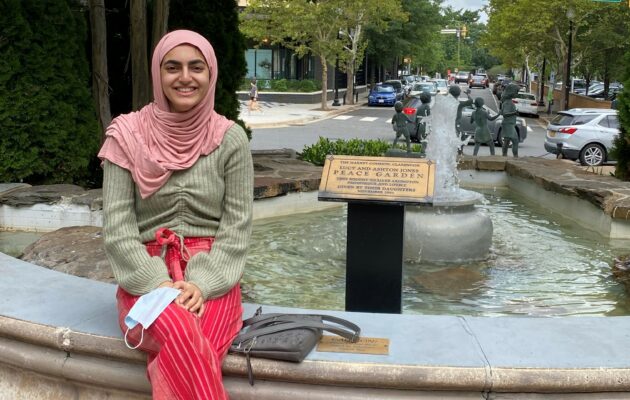Ask Away: 5 Questions for a Future Non-Profit Executive Learning Urdu, Spanish & Arabic

We’re asking students, recent grads, teachers, and counselors five questions on how languages play a role in shaping personal and professional success…
Meet Amna—a Delaware high school sophomore who plans to study biology/genetics and general social sciences in college, with a goal of running her own non-profit organization addressing addiction and addictive behaviors.
1. How long have you been learning Spanish, and what’s your favorite part of taking Spanish class in school?
I have been doing Spanish in school since seventh grade, but my exposure to it began much earlier. When I was pretty little, I had a babysitter who spoke Spanish and would teach me some words when we played together. I still have a drawing I made with her in which I labeled my pictures with the Spanish words for them. Beyond that, Dora the Explorer was one of my favorite shows as a kid. During a time when I didn’t have any representation in the media I was exposed to, I absolutely cherished a show in which the main character wasn’t necessarily from the same ethnicity as me, but still looked like me and was able to embrace her culture without feeling a need to assimilate or hide.
My favorite part of taking Spanish in school is being given a break from classes that often fit into a box and have a single interpretation to a much more exploratory subject in which I get to control where I go. My teacher (Profe C.) models his class to teach us about topics and units prevalent to culture and conversation in Spanish-speaking countries so that we can be equipped with background knowledge and know about topics instead of simply learning grammar.
Spanish is a class in which culture and heritage is explored in a way that incites cultural sensitivity and understanding in students, cultivating a form of empathy that serves people wherever they go.
For example, in our class we did a unit on food in which we explored various types of tacos. Upon seeing foods that did not fit into an Americanized perspective of normalcy, many students expressed feeling grossed out or disgusted by popular types of food. My teacher responded to this by explaining how many popular American foods can be perceived by other cultures and that this type of judgment can be harmful; he also explained the nuance of why some of these foods are popular and how the resources available and environment can affect the food choice of an area.
2. How do you use your Spanish skills outside of the classroom? Any practice tips to share with fellow learners?
I hope to be able to use it more, but as of now I love listening to Spanish music as I feel music is a way people can use their voices and connect to others that is so unique and powerful. I also try to use it when I can in real life, for example, I was in a Spanish grocery store buying ingredients for my Empanada project and I wasn’t able to find the Sazon seasoning. I found someone who worked at the store but they didn’t speak English. At first I thought I’d have to just keep looking, but I tried to communicate in Spanish and we were able to find it!
My biggest advice would be that if you come to a point in real life where you feel that you are able to use your language, do not shy away because you think you are really bad at it. Just try to communicate and the worst case scenario is that you will not be able to say what you need to say, but if you are successful the feeling of using a skill like language is so immensely rewarding.

3. Have you got a favorite word or expression in Spanish? (What does it mean and why did you choose it?)
My favorite expression has a pretty funny story to go with it. In my Spanish III class we are working on a unit of Leyendas Urbanas (urban legends) and my teacher wanted us to have the opportunity to draw and describe our very own criaturas (creatures). I have always had a vast and vivid imagination and what I hope is a good sense of humor so I loved this assignment.
My criatura was not the best artistically executed but I enjoyed writing about her and I wrote that she lives in Italy and eats men as she is a raging feminist. Her name, which is my new favorite phrase, is Destructora del patriarcado which means “Destructor of the Patriarchy” and is something I hope can be used to describe me one day as well (hopefully for less gruesome reasons though).
4. You’ve been selected to participate in the Virtual National Security Language Initiative for Youth (NSLI-Y) program in Arabic this winter—congratulations!! What are you most looking forward to about this experience?
Overall, I cannot wait to take the course, but I am most looking forward to making a community with other people who are in the same spot as me. Feeling that you are not very good at a language and trying to apply it can be such a daunting and vulnerable feeling (which is why we should all have empathy for those learning English!!) and can feel embarrassing as well, which is why a group of people who understand and can relate is so important. Relatability is often what gets people through tough situations, and while learning a language is super fun it is definitely no easy feat.
5. Why is it important to learn about languages and cultures? What changes, if any, would you encourage as an advocate for language education?
There are countless reasons why learning about languages and cultures is crucial; however, the ones that resonate most with me are the opportunities it creates and how it helps people.
Knowing another language opens up an entire community of people and an array of stories you are able to hear. Communication is how a society grows and how people learn from one another, therefore being able to speak to each other can spark so much necessary change and learning in our world. Learning about someone else’s culture and hearing their story creates sensitivity and empathy for the problems and experiences of other communities and helps open up our views.

Growing up bilingual has always made language important to me, as it was such a crucial part of my personal development and life experiences. Being able to speak Urdu allows me to communicate with my grandparents and hear their stories of their lives in Pakistan and the changes they saw during the partition. Knowing this language has allowed me to immerse myself in my culture and fully experience Pakistan when I visit while also allowing me to feel connected living in America.
I have also seen the importance of knowing languages from what I have observed living in a country where being fluent in English and having it as your first language is often ignorantly associated with intelligence and claim to an American identity.
Furthermore, I have seen this importance in my mother’s stories from her work and overall as an immigrant woman. She is an OB/GYN and has been able to help so many patients because she speaks Urdu and Punjabi and is able to make so many of them feel comfortable with her because they can talk in their native tongue. She also is very passionate about learning languages, especially Spanish, because she has been rather frustrated over how non-English speaking patients can get treated. For example, she has shared that despite the hospital having translators she has had to explain to nurses why they can’t just talk in loud English to a woman who is in active labor. I have also viewed how my family can get treated for having an accent, and I feel that a world in which language learning is encouraged and celebrated would solve this issue.
My mother’s struggles coupled with her promotion of language learning has fueled my own journey and inspired me. I hope to become fluent in multiple languages as it will help me learn about other communities and help me with my future dreams. I hope to create my own nonprofit organization one day that will hopefully study addiction and addictive behaviors and work to reform the rehab process and narrative regarding addicted and recovering people. I feel that knowledge of multiple languages will serve me as it will help my cause reach more ends of the earth and will help me research the social narratives and personal experiences of a more vast group of people.
Work needs to be done regarding the encouragement of language learning on various levels. On a school level, the school system should revere language classes as a core class and stress its importance while also making sure that it doesn’t take away from the class (i.e. turning it into a grammar class and taking away the freedom of language learning). Society can encourage it by showing how it helps people and incentivizing multilingualism in school and work spaces. An overall shift in narrative from the America-centric bubble many American citizens hide in into a wider and more inclusive Global mindset would encourage many positive societal shifts. Overall, increasing the accessibility and knowledge of programs that help teach language (such as NSLI-Y) would also be very helpful.
All in all, language learning is crucial and imperative for collective growth.
BONUS QUESTION: Complete this thought: “Learning another language means…”
Learning another language means giving yourself another perspective of and lens on the world—one that can make you view things in an entirely fresh way!
Check out our Connect with Urdu, Spanish, or Arabic pages to explore language scholarships, university programs, testimonials, and more! And, as always, visit @LangConnectsFdn on social media to share your story with us.
